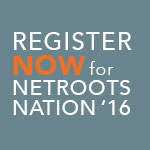After a great run, the Winning the Internet blog has been retired. However, you can still keep in touch with New Media Mentors here.
As we gear up for Netroots Nation 2013, we’re taking a closer look at some of the convention’s hottest training sessions. We’re interviewing the trainers and taking you inside some of online activism’s most popular and elusive topics.
Today we’re interviewing Daren Garshelis, who’ll be leading Influencing Public Policy in the Digital Age: Legal Rules and Regulations for Social Media.
NN13 Training Session
Influencing Public Policy in the Digital Age: Legal Rules and Regulations for Social Media
Nonprofits are built on a foundation of relationships, and tools like Facebook and Twitter allow nonprofits to expand our relationships and our worlds. But new tools come with a tangled web of rules and regulations, and many nonprofits are hesitant about engaging in online advocacy. Can a c3 lose its tax status over a careless Tweet? What happens when a politician “likes” your organization’s Facebook page? This training will clarify the rules for using social media, blogs and email as part of your advocacy toolkit. Trainers will give concrete examples and invite the audience to discuss hypothetical situations to develop a deeper understanding of the rules that apply to online advocacy.
Interview
Q: Tell us about yourself.
A: I work as Counsel with the Alliance for Justice Bolder Advocacy initiative, where I assist nonprofit organizations and foundations throughout the country on compliance issues related to nonprofit advocacy. I work to expand the capacity of nonprofits to influence public policy, and of foundations to support nonprofit advocacy, by – among other things – training groups through workshops and private consultations on legal rules affecting nonprofit advocacy work, including laws regarding lobbying and election-related activity. I principally work with nonprofits and foundations promoting immigrant, labor, LGBTQ, and reproductive rights, health care, education, economic justice and environmental protection.
Q: In your opinion, why is it important for organizations to be aware of rules and regulations when engaging in online advocacy?
A: Social media presents an amazing vehicle for advocacy, but it’s important that nonprofit advocates understand the legal rules to be mindful of when expressing their messages to hundreds or thousands of people at a time, especially when records of those messages will forever be accessible to others.
Q: What are the two most important things for an organization to keep in mind when engaging in online advocacy?
A: From a legal standpoint, I think the first question nonprofit advocates need to ask when they are commenting online is whether they are doing so on behalf of their organization, or whether they are doing so in an individual capacity. There’s a tendency to conflate the two, which might usually be unproblematic, but can create legal questions when it comes to partisan political commentary. Additional questions arise when c3 organizations link to content posted by others, who may not have the same rules applying to their communications.
Q: Why should folks attend your session at Netroots Nation, and how can they connect with you?
A: I’d like for attendees of this session to be able to leave confident that they can impact policy through digital advocacy, but to recognize where the potential legal risks lie for 501(c)(3) public charities.
I’m active on Twitter and encourage people to connect (@DarenAFJ).
To attend this training, or one of the 39 others at Netroots Nation 2013 in San Jose, register now.




Comments are closed.